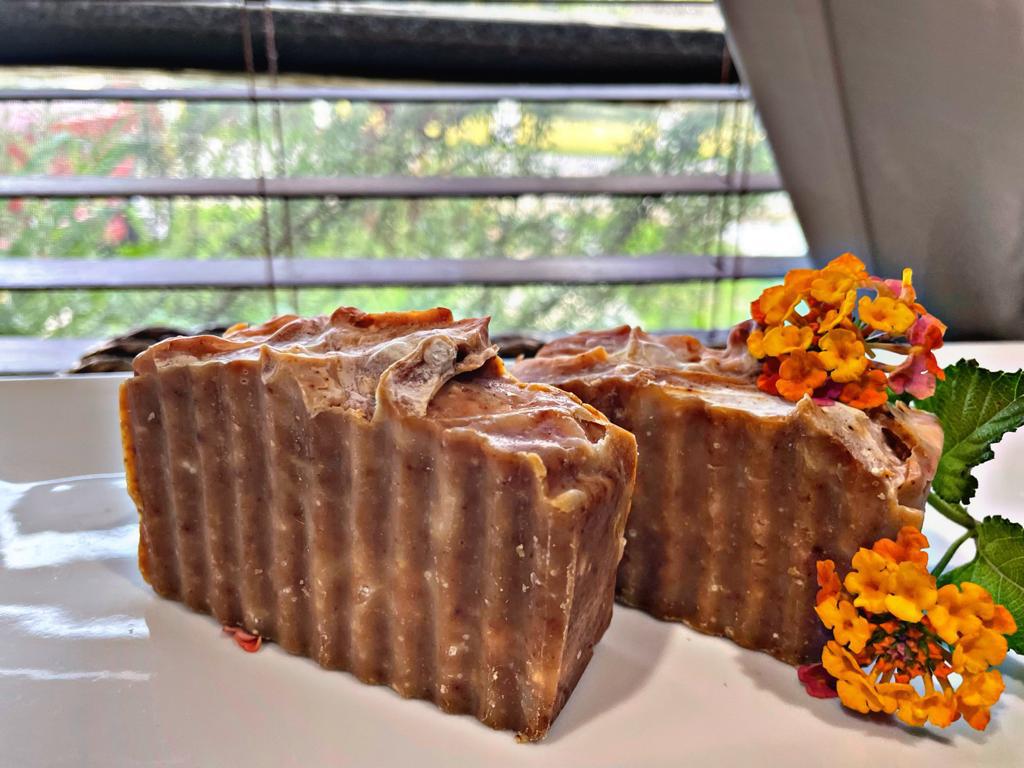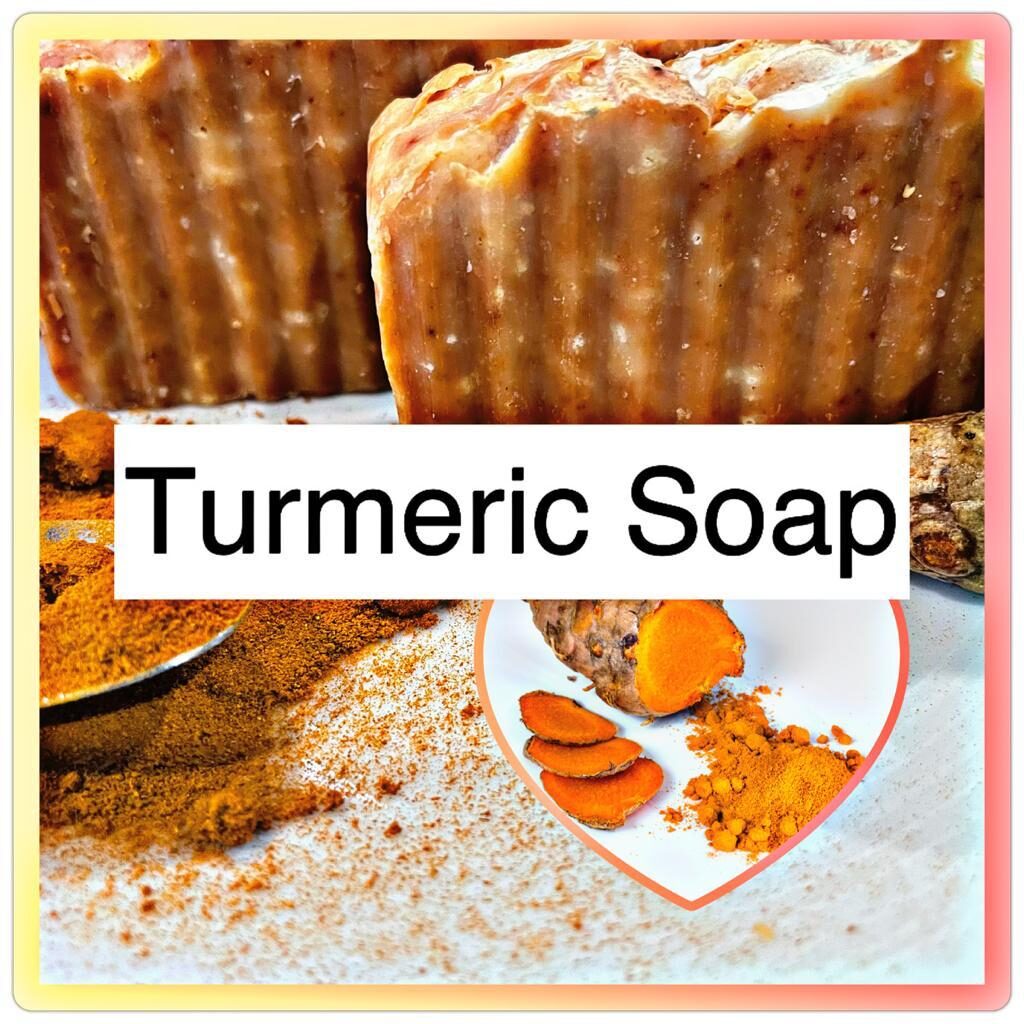Turmeric Soap is a great skincare product for anyone’s medicine cabinet. It is a best seller at my small Vegan Deli.

I have found that this soap leaves my skin beautifully toned, with an even complexion.
Benefits of Turmeric Soap
It has anti-inflammatory properties, which can help manage your skincare routine and other conditions. It also contains antibacterial and antifungal ingredients that can treat infections on the skin. Turmeric soap helps lighten your skin tone, too.
Turmeric Soap is Anti-inflammatory
If you suffer from arthritis, psoriasis, eczema, or any other inflammatory condition, then turmeric soap is a good option for you. Turmeric has anti-inflammatory properties and helps reduce swelling. This can decrease pain caused by inflammation which makes it easier to get around without worrying about your joints hurting.
Anti-aging
Turmeric is a natural antioxidant, and antioxidants help prevent free radical damage to the skin. Free radicals can cause premature aging by breaking down healthy cells. Antioxidants work by neutralizing these destructive molecules before they can do any harm.
Turmeric is also anti-inflammatory, which means it’s good for preventing wrinkles and other signs of aging caused by sun exposure or other environmental factors. Turmeric contains tannins that act as astringents to tighten skin and reduce pore size, which makes them great at treating acne as well as preventing future breakouts from forming in the first place.
Anti-microbial
If you have acne, athlete’s foot, or a yeast infection and you’re looking for a natural way to cleanse your skin and restore balance, turmeric soap may be the answer. The main component of turmeric, curcumin, has anti-inflammatory qualities, according to the National Center for Complementary and Integrative Health (NCCIH). This can help with reducing redness and irritation associated with conditions like acne and athlete’s foot. The NCCIH also reports that curcumin can help fight against bacteria that cause ringworm or other skin infections.
Skin-lightening
Turmeric Soap is used for skin-lightening. Research shows that curcumin, which is found in turmeric, is known for its ability to reduce hyperpigmentation and dark spots. This makes turmeric soap an excellent choice for anyone who struggles with acne or has experienced sun damage. It’s even beneficial for people who want to reduce dark circles under their eyes.
Antiseptic
Turmeric Soap has antiseptic properties that can help you get rid of acne and psoriasis. It works by killing bacteria and fungi that cause these skin conditions. To use turmeric soap on wounds, simply wash your face with the soap to remove dirt and oil from your skin. Then rinse it off with clean water before patting dry with a towel or cloth. Doing this daily will help heal any open wounds so they don’t become infected or develop into scars.
On acne-prone skin, turmeric soap works best when used at night before going to bed because it helps stop bacteria growth while you sleep (if possible). When washing your face in the morning, avoid scrubbing too hard because this could irritate already inflamed areas even more. Just let the water run over them until they’re clean enough for you.
Burns and wounds
Turmeric is a natural plant-based product used to treat wounds and burns. Turmeric also possesses antiseptic properties, making it useful for treating skin conditions like psoriasis or eczema.
Skin conditions like psoriasis and eczema
Anyone’s medical kit should have turmeric soap because it works wonders for a number of skin issues. Turmeric soap is an anti-inflammatory treatment for humans.
This makes turmeric soap an excellent option for people who suffer from conditions like psoriasis or eczema. It’s important to know that we should not self-diagnose or treat skin disorders without consulting our doctor. But if you need relief from symptoms like redness or itching, turmeric soaps may be just what you’re looking for.
Excellent skin care soap for all types of skin
Turmeric Soap is a great skincare product for all types of skin. Turmeric is an anti-aging agent, making it excellent at reducing the redness and swelling associated with acne. It is an effective treatment for psoriasis, eczema, rosacea, and other chronic skin conditions.
Turmeric has been used as an antiseptic since Hippocrates’ time—thanks to its antibacterial properties. If you’ve ever suffered from an infected wound or burn (or even if you just want to keep your skin looking fresh), turmeric soap can help soothe your pain while also disinfecting your injuries.
Turmeric Soap good for sensitive skin
Yes, Turmeric Soap is great for sensitive skin and good overall. This soap has antiseptic, antifungal, and anti-inflammatory properties. These properties help it to be a great facial soap for almost anyone.
Is lye soap vegan?
Homemade soap is made of natural ingredients like lye (sodium hydroxide), oils, and water. Lye soap is a traditional handmade soap that uses sodium hydroxide as its base ingredient. This type of soap generally has a high concentration of glycerol and potassium hydroxide which makes it unsaponifiable, meaning that it does not produce any lather or bubbles when rubbed on the skin.
How do you make vegan soap?
The first step in making soap is saponification. Saponification is the chemical reaction between lye and fat, which creates a reaction that results in soap. You need to make sure that you are using the right kind of lye for this process.
In order to produce or make a hard bar of soap. soap makers only need to use soybean or canola oil. The stearic acid found in these oils produces a hard bar.
Olive and coconut oil are more expensive than highly refined vegetable oils because they have less stearic acid content and require additional processing by the manufacturer before they can be used in making soap.

Not only is turmeric good externally, but it is excellent for inflammation internally, you can read more about the Benefits of Turmeric by clicking the link.
The pleasure would be all mine to have you join my Something Better Family FaceBook page.

Can I just say what a comfort to find somebody who truly understands what theyre talking about on the net. You certainly understand how to bring a problem to light and make it important. A lot more people really need to look at this and understand this side of the story. I cant believe youre not more popular because you definitely possess the gift.